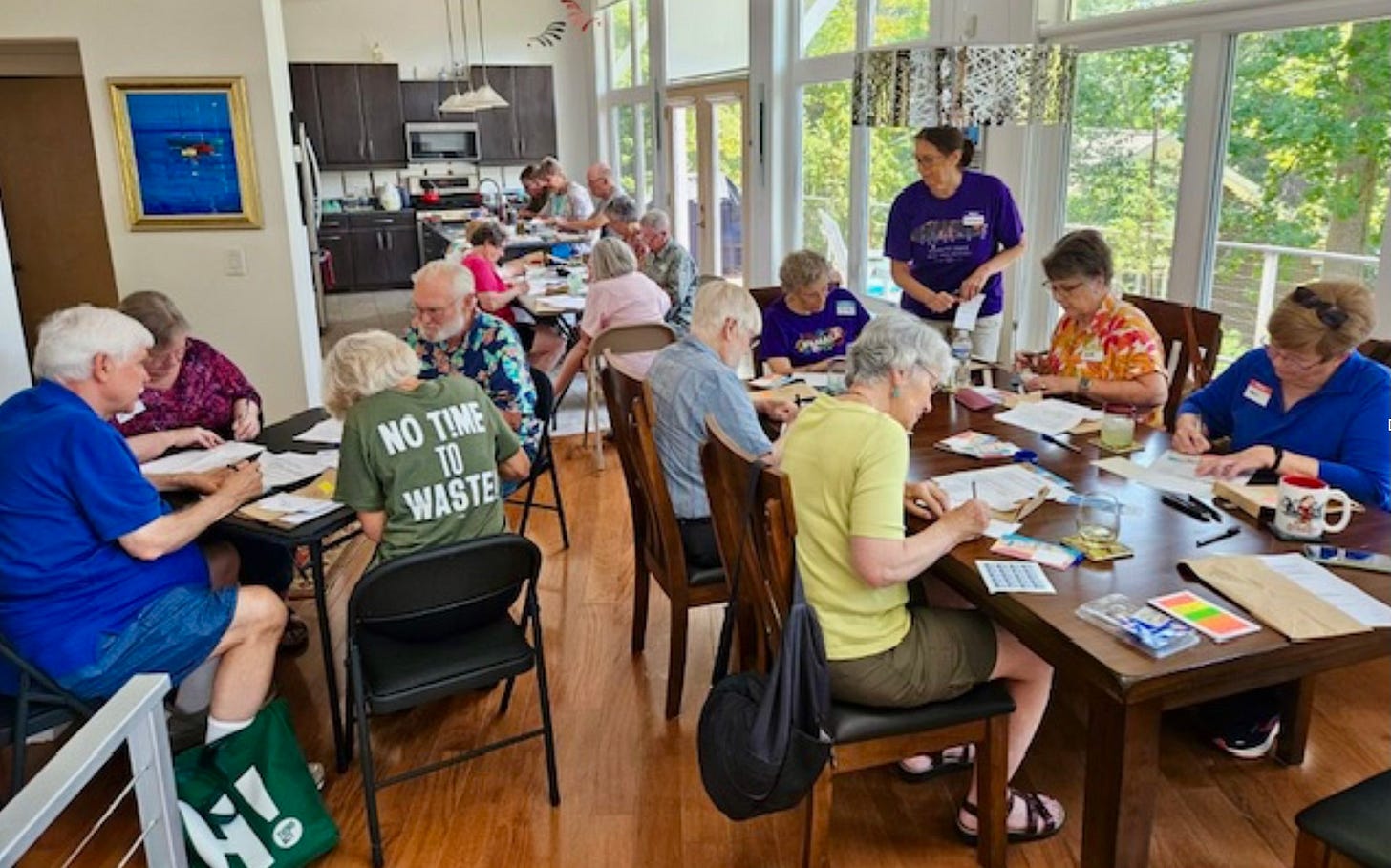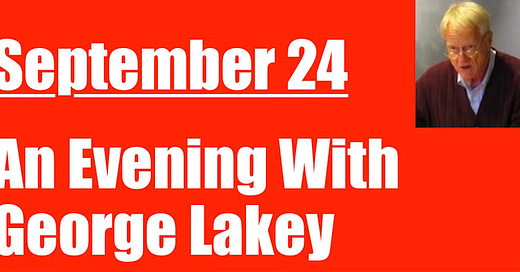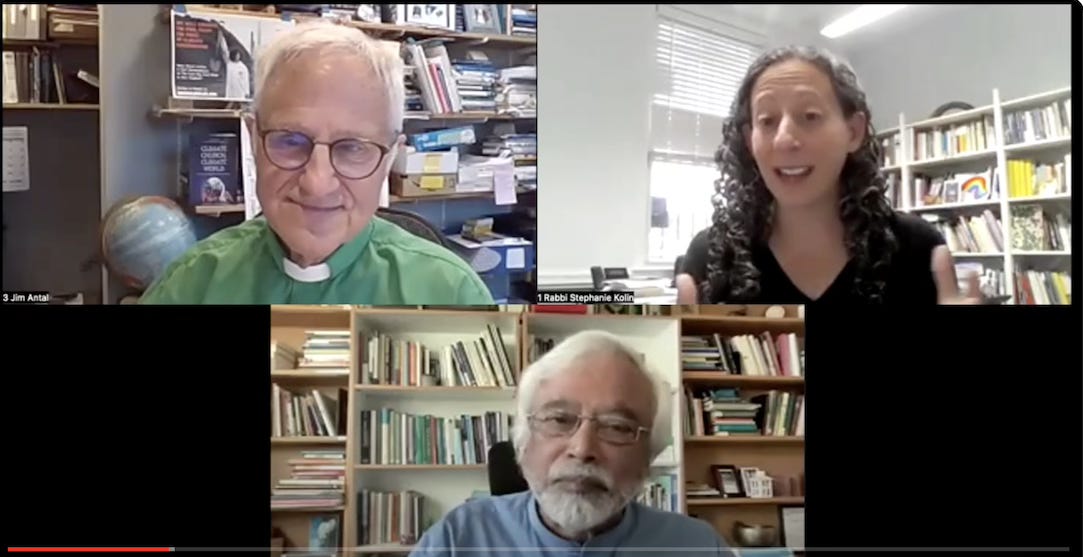September News & Views: Election Issue
UPCOMING FROM TAF
FOR ITS SEPTEMBER GENERAL MEETING, Third Act Faith is delighted to host a talk by Quaker author and activist George Lakey. Starting with his activism in the ban-the-bomb movement in the 1950s, George has led activist groups, taught and directed nonviolent protest, and is the subject of an upcoming documentary. Join us next Tuesday, September 24 at 4:00 PM PT/7:00 PM ET for an unforgettable evening with this champion for peace and justice. Read more about George and register for this Zoom meeting on our website.
Third Act Faith to Offer Contemplative Zoom Gathering October 29
ON OCTOBER 29TH, EXACTLY ONE WEEK BEFORE WHAT MANY FEEL will be one of the most consequential elections in our nation’s history, Third Act Faith will host a Zoom gathering for those who are looking for a faith-based way of grounding each other to help prepare for November 5th.
For one hour, from 4:00-5:00 PM PT (7:00-8:00 PM ET), gather with Third Act Faith members for a 30-minute interfaith contemplative service, followed by a 30-minute open-ended group conversation meant to help bolster our trust that democracy will prevail on November 5th.
If this sounds like something you would find helpful, click here to register. (Note: we will not be recording this gathering.) For more information, email thirdactfaith@gmail.com.
TAKE ACTION THIS ELECTION SEASON
‘Preaching an Election Sermon’:
What We Learned at Our Workshop
AS WE APPROACH THIS CRITICAL ELECTION, Third Act Faith hosted an interfaith workshop on August 27 about preaching an election sermon, led by Rev. Dr. Jim Antal, Rabbi Stephanie Kolin, and Imam Jamal Rahman.
Although election sermons are a longstanding tradition, many clergy are hesitant to preach them, fearing they will violate IRS regulations against endorsing specific parties or candidates. Rev. Antal explained that the ban on partisan actions does not preclude discussion of politics, as he reminded us: “Engaging public life is as important as any purpose of the church, the synagogue, or the mosque.”
All three religious leaders noted the unique role that congregations can play in bringing people of different political beliefs and parties together to find common ground. By creating safe space that is lacking in other parts of society and drawing on their sacred scriptures, congregations can make a huge difference in how American culture navigates the coming months and years.
THE PANELISTS AND PARTICIPANTS MADE SOME SPECIFIC SUGGESTIONS for preaching election sermons and for individual actions. Asked to share a relevant scripture passage, Rabbi Kolin offered Numbers 27:1-11, a story about how the daughters of Zelophehad challenged Moses and other leaders to deal fairly with them after their father died. Imam Rahman cited several passages, including a caution to consult your own heart, no matter what religious authorities say, which is mentioned 132 times in the Qur’an.
Rev. Antal gave participants a list of resources for preaching an election sermon. He will also be taking part in another panel on Tuesday, October 1, at 4:00 PM CT/7:00 PM ET, discussing “Politics, the Media, and the Church’s Role in Truth-Telling in an Election Season.” Details and the registration link are on the website for the Wisconsin Council of Churches and the Clergy Emergency League, which is sponsoring the event.
Workshop participants were encouraged to compare party platforms and candidates’ positions to specific religious texts or values that we hold dear. Such values could form the core of an election sermon and provide clear guidance to all of us as we prepare to cast our votes in November.
A video of this online workshop is available on the TAF YouTube channel, and more details are on the TAF website.
Postcards and Potlucks

By Dan Terpstra, TAF Coordinating Committee Member and TA Tennessee Co-facilitator
I SAT AT THE CARD TABLE, HAND WRITING A POSTCARD to yet another unknown Ohio mail-in voter, encouraging them to do it again in the upcoming election. It was one of ten postcards I had been assigned that day – a small task, but it felt somehow more significant to do it surrounded by fellow Third Actors and friends.
As I wrote, listening to the buzz of conversation around me, I felt the energy in the room and the developing sense of community and shared goals among the 19 of us. Although this was a Third Act Tennessee event, I realized that a third of these folks were members of my adult Sunday School class. I also realized that Sunday School classes or other fellowship groups within faith communities would be perfect opportunities to organize postcard writing parties to build (or build on) community and common goals. And for faith communities, it also offers an excuse for a potluck!
If you are a member of a congregation, you might want to consider organizing a postcarding party. And for good measure, make it a potluck with a twist: ask everybody to bring a vegetarian or vegan dish, along with the recipe. It’s a great way to broaden the food horizon of your congregation and encourage eating lower on the food chain.
For example, instead of going to that favorite Mexican place after church, throw a postcarding potluck. Invite adults to Senior High Fellowship on Sunday evening and make the postcarding (and potlucking) cross-generational. Make the Wednesday night dinner at church vegetarian and invite everybody to write postcards. The opportunities are endless.
THROWING A POSTCARDING PARTY IS EASIER than you might think. Third Act has some great resources on their website. You can print cards from their template yourself or at a local printer, or you can order them online.
Activate America can provide as many names and addresses as you want for any of a variety of campaigns, ranging from GetOutTheVote campaigns in swing states to endorsements of specific candidates. Pick your comfort level. If you have a budget, you can buy stamps, or ask people to stamp and mail the cards themselves and report back. It costs less than $6 to mail 10 postcards.
If you’re still feeling overwhelmed and intimidated, don’t be. Third Act Tennessee has assembled a list of tips to make this whole process run smoothly.
It’s easy. It’s important. It’s urgent. And it’s a great way to build community. Don’t wait — start planning today!
What Can I Do to Support the Election?
Tips From TAF
NOT SURE WHAT YOU CAN DO TO SUPPORT THE UPCOMING ELECTION? Here’s what members of the TAF Coordinating Committee are doing:
From Kathleen Dickson:
“My circle of women friends are planning on doing a ton of postcarding! So far, I’ve done 100 on my own; my friend got us another 200 to do as a group; and I have another 400 cards, give or take, which just need voter lists and scripts to go with them. I’m also planning to support my congresswoman’s re-election campaign with some canvassing this month. Oregon, where I live, is a “vote-by-mail” state, so there are no polls to work on election day; we start voting in mid-October.”
From Debra Rienstra:
“I’ve been writing postcards to encourage turnout in Ohio, working through Activate America. I’ll also be encouraging my students (I teach university undergraduates) to vote and providing them with information about candidates and about how to register.”
From Ruah Swennerfelt:
“I’ve been doing a lot of postcarding. I will also do poll work on Election Day. I’ve been sharing my concerns at my local Quaker Meeting and urging Quakers to take action.”
From Ace Leveen:
“This really seems to be just about the most important election of our lifetimes. I wouldn’t be able to face my kids and grandkids if I sat this one out. I support candidates with modest contributions, especially through an excellent group called Focus 4 Democracy. They carefully pick local, often grassroots organizations in swing states that are working mightily to get folks to register to vote and then vote by raising money for their organizations. I am also about to do phone banking through a Jewish group, Dayenu – though I sure don’t like calling people up! We’ll be calling folks in Pennsylvania. But again, I want to face my grandkids! Finally, I was really proud of the two Third Act Faith programs we offered – a panel on the Sacred Right to Vote and a workshop on Preaching an Election Sermon. Thanks Rev. Jim, Rabbi Stephanie, and Imam Jamal. That was an inspiring night!”
From Jim Antal:
“Third Act Faith is doing a great job reminding its followers that NOW is the time to take action. On October 1 at 4:00 PM PT/7:00 PM ET via zoom, I’ll be on a panel discussing “Politics, the Media, and the Church’s Role in Truth-Telling in an Election Season.” It’s sponsored by the Wisconsin Council of Churches and the Clergy Emergency League, and you can register here. I’ll also be preaching an election sermon in Tennessee. And I’ll be supporting and participating with the Environmental Voter Project in various ways.”
Other Ways to Get Involved
If you live in an area where there is a Third Act regional working group, contact them to find out about activities specific to elections in your state or local community. Check the Third Act website to locate a group in your area and get connected.
To get involved in election related activities, visit GrayPAC, a political action committee powered by Third Act—“mobilizing Americans over 60 to elect leaders and support policies for a sustainable and vibrant future for our democracy and climate.” At GrayPAC you can read about what other elders are doing, and donate to help secure climate protections and justice in our communities.
Harris/Walz and Climate Action
SHORTLY AFTER HER NOMINATION FOR THE PRESIDENCY, Vice President Kamala Harris said that one of the “fundamental freedoms” at stake in the upcoming election was “the freedom to breathe clean air, and drink clean water and live free from the pollution that fuels the climate crisis.”
“We need to unite behind Kamala Harris’s ongoing climate leadership in the transition to a new, green economy,” wrote botanist and author Robin Wall Kimmerer on ThirdAct.org. Although religious organizations cannot endorse specific candidates, Third Act supports Harris/Walz. (They endorsed Pres. Biden in March and have continued to support the Democratic ticket).
Early news reports following the nomination noted that Harris was an original supporter of the Green New Deal legislation (the Green New Deal Network recently endorsed her), and that she once opposed fracking. It's also been reported that Harris has since come out in support of fracking, and her campaign has said Harris does not continue to support the Green New Deal.
When Harris picked Minnesota governor Tim Walz as her running mate, she picked a man who had signed an executive order to create a subcabinet agency focused on climate change shortly after he’d become governor in 2018, then signed legislation speeding the permitting process for building renewable energy sites. On Earth Day this year, Walz said he’d signed over 40 climate initiatives into law.
SO WHAT DOES THE DEMOCRATIC TEAM OF HARRIS/WALZ SAY about their climate priorities? It’s complicated. In today’s U.S. political landscape, candidates know they can’t win the Electoral College by appearing “too” progressive. And if Harris/Walz don't win, we get Donald Trump, who’s promised to support fossil-fuel expansion.
In her interview with CNN Aug. 29, Harris said, “I think the most important and most significant aspect of my policy perspective and decisions is my values have not changed.… I have always believed — and I have worked on it — that the climate crisis is real, that it is an urgent matter to which we should apply metrics that include holding ourselves to deadlines….”
On the official Harris/Walz website, the issues tab opens to reveal 10 priorities, of which “tackle the climate crisis” is at the bottom.
In the last question for the candidates in the Sept. 10 presidential debate, moderator Linsey Davis said, “Vice President Harris, you call climate change an existential threat. …What would you do to fight climate change?”
Harris responded,
[Climate change ] is very real. You ask anyone who lives in a state who has experienced these extreme weather occurrences who now is either being denied home insurance or is being jacked up. You ask anybody who has been the victim of what that means in terms of losing their home, having nowhere to go.
We know that we can actually deal with this issue. The young people of America care deeply about this issue.
I am proud that as vice president over the last four years, we have invested a trillion dollars in a clean energy economy while we have also increased domestic gas production to historic levels. …We have invested in clean energy to the point that we are opening up factories around the world. …part of building a clean energy economy includes investing in American-made products, American automobiles. It includes growing what we can do around American manufacturing and opening up auto plants…
More on Harris's climate positions:
Climate experts lament Harris’s vow to keep fracking, The Guardian, Sept. 11
The Climate Movement Rushes to Embrace Kamala Harris, Inside Climate News, Aug. 24
Harris’s New Strategy: Equate Fighting Climate Change With ‘Freedom', The New York Times, Aug. 23
Harris Stirs Hope for a New Chapter in Climate Action, Inside Climate News Aug. 18
Read stories on Walz's climate record from The Guardian and National Public Radio.
IN CLIMATE NEWS …

Panels and pollinators — together!
In the Sept. 6 issue of The New Yorker, Bill McKibben explains “How to Address Two Environmental Crises at Once” by growing native pollinator plants on solar farm land. Bill's story is behind a paywall but see this free article with similar news from The New York Times.
How TV shows can ‘boost climate friendly food norms’
A study out last month shows that even small changes in storylines of TV shows can significantly “boost climate friendly food norms.” When test audiences watched a modified scene from “Sex and the City” showing Miranda at lunch with friends at a Chipotle restaurant, changing her order from steak to a plant-based protein after giving it some thought, the results with the audience showed. “Just like in life, these moments were small — friends ordering a quick bite while out together or chatting over a meal… but the results were [statistically] significant,” say the researchers.
From the report:
Seeing a character on screen order a plant-based option increased the audience’s beliefs that:
reducing the amount of meat we consume “is the right thing to do”
more trendsetters are currently reducing meat in their diet and even more trendsetters will be reducing meat in the future
more trendsetters expect other people to reduce meat in their diet
ordering a plant-based option is normal
plant-based options are associated with health and environmental benefits
“Most importantly,” said the report, “we did not see any evidence that including a plant-based order negatively impacted the entertainment value — neither in terms of how much audiences liked the characters nor how much they liked the scene overall.” Read the report .
The strategy of adding these kinds of storylines is especially valuable, they say, because “people don’t like to be preached to about food.…[but] having something that can show up quietly, from characters they already love” is effective.
Good news/bad news
Solar energy in the U.S. continues to grow, and now generates over 20 percent of the country's electricity. Prices have dropped dramatically as well, and newer solar rooftop installations are capable of generating more electricity. Good news for the climate, right? Yes. But…
“The climate benefits of this growth were undermined by a rapid rise in electricity demand,” says the Energy Information Administration, — and what’s causing that rise are data centers for cryptocurrency and artificial intelligence (AI). It's forecasted that by 2026 these uses of energy will rival the energy consumption of the entire country of Japan. This article from Vox explains more.
According to EIA, these extra energy needs are being met “in large part by an increase in generation from fossil fuels.”
Upcoming Events
Click on the link to register for the online events.
September 23: Welcome to Third Act: Let’s Get Started. (Zoom), 4:30 PM PST / 7:30 PM ET. REGISTER HERE.
September 24 : General Meeting with George Lakey. (Zoom), 4:00 PM PST / 7:00 PM ET. REGISTER HERE.
October 7: Welcome to Third Act: Let’s Get Started. (Zoom), 4:30 PM PST / 7:30 PM ET. REGISTER HERE.
October 23: TAF Contemplative Practice. (Zoom), 11:00 AM PST / 2:00 PM ET. REGISTER HERE.
October 29: Pre-Election Contemplative Gathering. (Zoom), 4:00 PM PST / 7:00 PM ET. REGISTER HERE.
Send us your photos and stories
Please send us news items, reflections, story ideas and photos that we can use on our web pages and include in our monthly email. Send the submissions to thirdactfaith@gmail.com.
Follow Us
Facebook
Instagram
Visit our website






